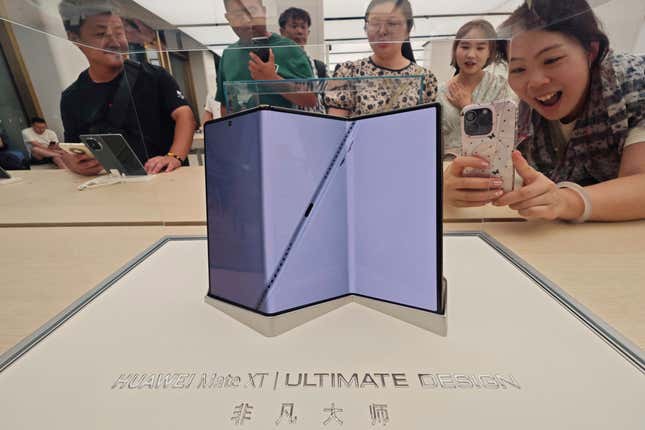
In This Story
As it races Apple (AAPL-0.39%) in the Chinese smartphone market, Huawei debuted its new smartphone hours after the iPhone maker unveiled its latest model.
Huawei launched its 10.2-inch, trifold Mate XT smartphone on Tuesday in Shenzhen, China, hours after Apple introduced the iPhone 16.
“Today we bring you a product that everyone can think of but could not make,” Richard Yu, Huawei executive director, said at the launch, according to Reuters. “Our team has been working hard for five years and has never given up. Today we will once again rewrite the history of the industry, turn science fiction into reality, and lead a new era of folding devices.”
The Mate XT starts at 19,999 yuan, or $2,800, and has around 4.5 million pre-orders, according to the Chinese smartphone-maker. Pre-orders started on September 7, and do not require a deposit. Yu said the new smartphone, which uses the company’s Kylin chip, features an AI-powered assistant for text summarization, translation, and editing, according to Reuters.
Meanwhile, Apple unveiled the new iPhone 16 series, as well as upgrades to its Apple Watches and AirPods, on Monday. The iPhone maker demonstrated its new AI features, dubbed Apple Intelligence, which will power native apps such as Safari and Notes, as well as Apple’s voice assistant, Siri. The AI features will be rolled out in phases, with early features being made available through a software update in beta in October for iPhone 15 Pro models and newer. The update will be available on iOS 18, iPad OS 18, and macOS Sequoia.
Since releasing its Mate 60 Pro smartphone series last August, Huawei has outpaced Apple in the Chinese market. In April, the company reported a rise in profit for the fourth consecutive quarter, also showing resilience against U.S. sanctions.
Meanwhile, Apple’s iPhone sales fell 19% over the same period — its worst performance in China since the start of the COVID-19 pandemic in 2020. Apple’s share of China’s smartphone market also fell year-over-year in the first quarter of 2024 from 19.7% to 15.7%. The company has had to cut prices on some iPhone models in the Chinese market as competition grows with Huawei and other homegrown smartphone-makers.